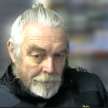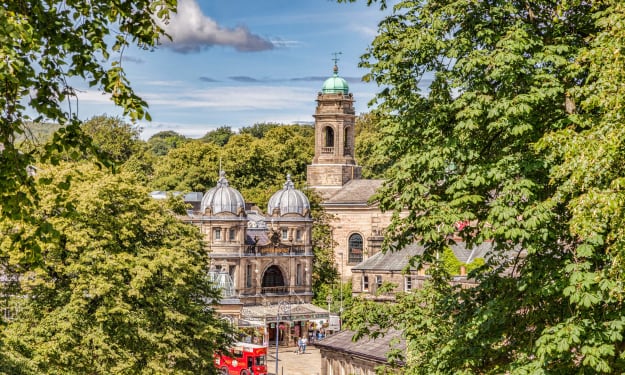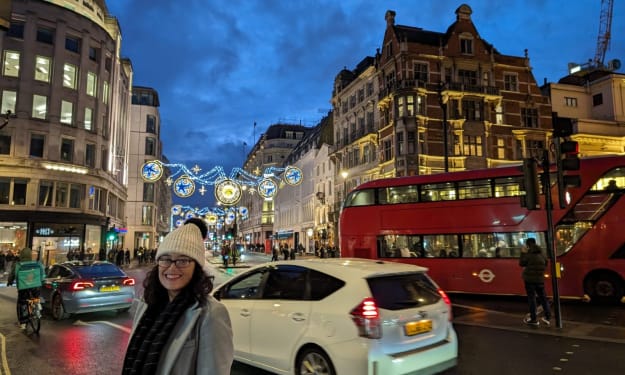
The evening streets are full of echoes as we meander downhill through the golden dapple and lengthening shadow, the drowsy warmth radiating from bricks and concrete and ceramic tiles as the long hot day breathes out. Our laughter too hangs in the air, lingering in the hour between the insane heat of the day and the chill of the night ahead, reverberating, softening and fading against dry dust, mingling with rich smells and subtle sounds. The sharp tang of garlic and spices, the feral waft of drains and ditches, the smoke of charcoal and incense, the ghost of petrol fumes, threaded by the musical skeins of goat bells drifting down with uncanny clarity from the foothills of the mountains crowding behind the town.
A dog hunts nervously past us in the opposite direction, furtive and alert in the shadows, following her nose and wits towards a stony bed. Each house we pass is a secret realm, its high plain walls revealing nothing to the outside world. From beyond, the laughter of women and children drifts, the ring of a tin basin, the musical splash of water. An occasional palm pushes sharp fronds into the twilight. Flies buzz heavily around a donkey standing in a puddle of sunset. A makeshift lean-to glitters magically on a street corner.
The stillness is suddenly shredded as a motorcycle hurtles its unseemly way up from the valley below. Two riders with open shirts, brown skin, bare legs, close-cut shiny blue-black hair, bright smiles revelling, the exhaust billowing oily smoke, the angry Japanese piston undimmed.
We duck down a narrow side street between mud walls, along an uneven pavement spattered with drying figs and sticky black ants. Flowing script names it in knots my tongue cannot unravel, adding a mystery to the mundane born only of my ignorance. Ahmed stops by a steel door and presses the bell.
After a few moments the door is opened by a shy young man. With smiles and lowered eyes, he draws us into a courtyard of brick and whitewash, blushing now in the light of the sunset. A low tree stands in the centre and at the corner of vision, a scuttle of small limbs and whispers betrays the interest of children. We're ushered into a Spartan room painted in the mentholated green of a city hospital scrub. As the day closes down, the light of naked bulbs begins to assert itself. Six or seven young men, Ahmed's friends, are ranged around the smoky room. There are low tables, beautiful rugs. Each moment seems somehow charged and subtle, strange and cinematic as we stumble through smiling salaams.
On the otherwise bare wall hangs a picture of Pahlavi retouched like Shiva in his pure skin, a dubious icon, his strange eyes following us as our Farsi is exhausted and Ahmed steps into the breach. I want to feel connected. I am almost wantonly open to camaraderie. Of course, we’re strangers here - but there's an additional dimension to our alien strangeness. We are made welcome, feted even within the sanctum of the home, and yet our communication is blocked by something more than language. Perhaps we ourselves constitute a danger, coming as we do from the west – and yet... We’re offered fruit, sweet tea.
Our privileged few years have led us to believe that that our lives actually count for something. We’re blissfully ignorant of the reality – that there are no natural rights. Locke was wrong. One glance around is enough for us to know that here too there is love and family, no less than anywhere else. But these young men already understand that in truth there are dark places, prison cells where pain promenades in full, brutal view and all hope vanishes. They live with the knowledge that life, and liberty, and most especially the pursuit of happiness are at best fleeting in a place where everything can be stolen in a heartbeat. A loose tongue, a misplaced whisper - and life changes irrevocably and forever.
And of course, they know that we do not share this knowledge. This was the barrier I sensed back then, but couldn’t see – a wall which we encountered but never really understood until so much later. In the deeper echoes of the evening which was to follow, and in the vivid memories it left me, were the clues and lessons I would later unravel. Like all of the best memories, this one would feed my understanding - for even as it was laid down it was replete with a store of lessons for a later me.
After a short while, the bell rings again in the courtyard. Ahmed and his friends rise to greet and honour Babak – and we all follow their lead. Babak is revered. Instantly likeable, rotund, greying at the temples, with that warm, sincere smile which politicians try, but never quite manage to fabricate. He has a rich voice, a quiet grace. A dignified charm. He modestly introduces himself as a teacher from the local school - but we already know that he’s more than that. An important person here, keen to meet us - rare travelers as we are from a world he has never visited yet holds in high esteem. The quality of his cotton cuffs and their garnet links, the heavy watch and rings, the sophisticated aftershave are tangible clues to wealth we would not normally associate with the business of education. And yet he wears jeans.
His English is as impeccable as his manner. Time is short, events compressed – we will only be here for a day or two. He is curious, but gentile - coaxing our opinions, our views concerning freedoms, education, our place in the world. He is fascinated at length by our travels, interested in depth by our objectives and the stories about what we have seen on our journey so far. We are drawn effortlessly and willingly into his circle, moths not so much as to a candle, but to a benign glow.
"So", says Babak, "Clearly you have seen our monuments and museums. But I would like to show you something different. Something more … ", he pauses a moment. "Something more intimate. If you would like?"
"I have a garden, you know – a special place. This is very important here in our country where it is so arid. We cherish such places. I think this is more what you might call an orchard." He pauses again, as though on the cusp of something. "I think you will like it. Will you come?" It seems to be a strange time to visit a garden. "Not this one", he smiles. “I am sure you will enjoy this experience. It will be my gift to you - and you will be quite safe with me.” A strange thing to say perhaps, but safety proffered by strangers is always exciting, so we agreed.
Soon we’re outside again in the gathering darkness, a group which has swelled to maybe a dozen or so of us clattering, this time steeply downhill through the empty streets. Lamps are strung haphazardly here and there from buildings and posts along the way, suspended from a spidery afterthought of cables and wires. Moths and beetles whirl and dance crazily above us, bright sparks caught momentarily against the blue-black heaven. The sepulchral glow of a television waxes and wanes behind the windows of a modern block, and unfamiliar music drifts briefly to our foreign ears.
As we move down into the valley and out of the town, the mettled road gradually peters out to become a rutted track, and the air changes slightly. The sky opens above, providing a view into the void beyond, out of which the stars and a fattening moon now blaze with discrete intensity. Under such a night it's easy to sense the delicate cellophane of life stretched thin around our planet, and to thrill at the helpless feeling of being borne along, hurtling silently through space at invisible, breakneck speed. There are no infernal lights here to be diffused, and the mountain air above us holds nothing to obscure the infinity of our insignificance. After a while, low bushes and then trees begin to close around us. A little further, and the sudden scent of damp earth is almost intoxicating after the parched and dusty day. The undergrowth around us crackles with insects and the air hums with their music. And then we are walking through a sea of moonlight, caught between high walls again. Now though, the walls are all baked earth, and there are no houses beyond. Behind and above us the distant town twinkles against the dark starless bulk of the mountains.
Babak stops and fumbles for keys at an ancient doorway, set back in a shadowy recess. There's a gentle creak as the heavy wooden gates open inwards and we follow him through and into the enchanted space beyond. A well-trodden path threads its way along an avenue of limed trunks where the air is sweet with the scent of fallen apricots. The plump clay beneath our feet gives slightly and there is a hint of woodsmoke drifting between the leaves as at last we enter a broad clearing.
The house is a low outcrop of sensuous shapes growing naturally from the ground. There are outbuildings with whitewashed rock walls, and domes of bare dried mud half eclipsed in the silvery light. An elderly man emerges and greets Babak with warm respect but not, I note, with deference.
"This is my gardener, Mazdak". Babak introduces us - and our small entourage salaam in turn. Barefoot, we follow him into a large room, slightly smoky and fragrant with the lingering resin of incense. The fire burns in a simple arched fireplace set into the wall where teapots and glasses glow and glitter. The floors are layered with kelims and carpets and the walls ranged with cushions. Aside from the firelight, lanterns throw warm, round patterns and moving shadows. Eyes flash and crinkle, and conversation starts all around us, friendly and enveloping in this wonderful place.
Tea is brewed and distributed, the colour of sherry in small glasses dry with tannin, sweet with sugar, fragrant with mint. There are almonds and oranges, slices of pomegranate and apricots. After a while, during a lull, one of the young men raises his voice slightly and begins what I think at first may be a prayer or ritual. Someone appears at my side and whispers that this is an ancient story. “Almost as old as the earth beneath us”. The sound of the incantation is rhythmic, liquid - not quite poetry - not song either, but somehow musical.
A stringed instrument is conjured, four pegs and a long neck with a colourful gourd-shaped body. Another man produces a wooden flute. The notes are tentative at first and then gradually cohere into a gentle counterpoint between the resonant buzz of the strings and the soft breathy reed. Mazdak brings out other instruments and the music passes backwards and forwards between musicians.
After a while, Babak and Mazdak come over and sit next to me, and Babak looks at me with dark, sincere eyes. "You do not have to try this, my friend - but this is part of the ancient traditions of these mountains. It is very beguiling. People can become lost." He pauses. "But then that is true of your alcohol too, I believe?" He smiles. Mazdak passes him a strange looking pipe – beaded mouthpiece, long stem and a small bulbous bowl. I realize that this must be for opium.
Looking around at the firelight and the faces, I feel no pressure, just a sense of opportunity. For some instinctive reason, I trust Babak - and so I nod. "All you need to do is breathe”, he says. “Just breathe lightly”. Mazdak produces metal tongs and a glowing coal and then I inhale.
The smoke is sweet, cool and intense. There is no harsh catch in the chest, just the sense of something which is somehow huge and powerful, something muscular and serpentine, something rich and heady which I have never tasted before. I take another pull. Babak smiles. "That is enough for now". And indeed it was enough, enough then, and enough forever. Just enough.
My inner pulse slows and the notes of the music begin to blend fully and completely with the firelight and the glittering, dark eyes and the gentle interludes of conversation, the dreamy lamplight and the fruit and the steady voices, the warmth and fragrance, the fantastic patterns and shadows, the tea and drowsiness, and then Mazdak adds his voice, sometimes singing joyfully along with his friends, sometimes reciting poetry, telling stories as though to children, pulling faces, drawing laughter.
And at last his voice is raised alone and at length - and listening, I fall gradually into a place between waking and sleep, dreaming for my future the story of these mountains. The true meaning was in the music of that one voice and Mazdak's long blissful, haunting, anguished song – a song whose words I will never understand and never hear again, the memory and meaning of which will always be fresh in my mind, and will never leave me until the end of my life.
About the Creator
Bob Sutton
One time painter, latter day keyboard warrior, full time software engineer and wannabe writer.






Comments
There are no comments for this story
Be the first to respond and start the conversation.